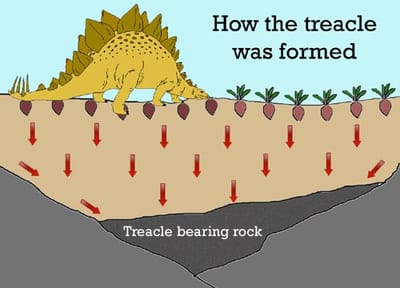The Treacle Mines of Pudsey

Natural treacle is formed over millenia in much the same way as petroleum. The whole area where Pudsey now stands was once a 'savannah' of sugar beet. Grazing dinosaurs cropped off the exposed greenery of the plants leaving the sugar rich beets lying untouched below the ground. Centuries upon centuries of this occurence led to the ground becoming saturated with monosaccharides as the decaying beets released their simple natural sugars. These filtered down through the ground until they encountered a barrier of impervious rock, where they pooled, and over the centuries under heat from the Earth's core below and pressure from the weight of the ground bearing down from on top were transformed into pure raw treacle, which was then absorbed into layers of porous rock. These deposits were first discovered in the 11th century by a peasant digging a well, and within a few years of this event a flourishing mining industry had arisen in the district, shafts being dug and the prized "trock" (treacle-bearing rock) being hauled to the surface in leather buckets.
The trock was then thrown into large vats of boiling water and boiled for around an hour. The heat thinned the treacle and the water then seeped into the trock pushing the treacle out. After an hour, the spent trock was removed, fished out by nets, after which the remaining solution would continue to be boiled until all the remaining water was evaporated away and all that was left was pure treacle. The spent trock would then be happily taken away by the poorer villagers who would boil it again in their own smaller pots and pans to yeild a second, paler harvest of inferior golden syrup.
By the time of the Industrial Revolution, the treacle deposits were running low, and as in most other places, mechanisation soon led to their complete exhaustion. The treacle in Pudsey finally ran out about a hundred years ago. The mine shafts since then have collapsed or been filled in, and the surface treacle yards and silos built over so that virtually nothing remains of this once thriving industry.

